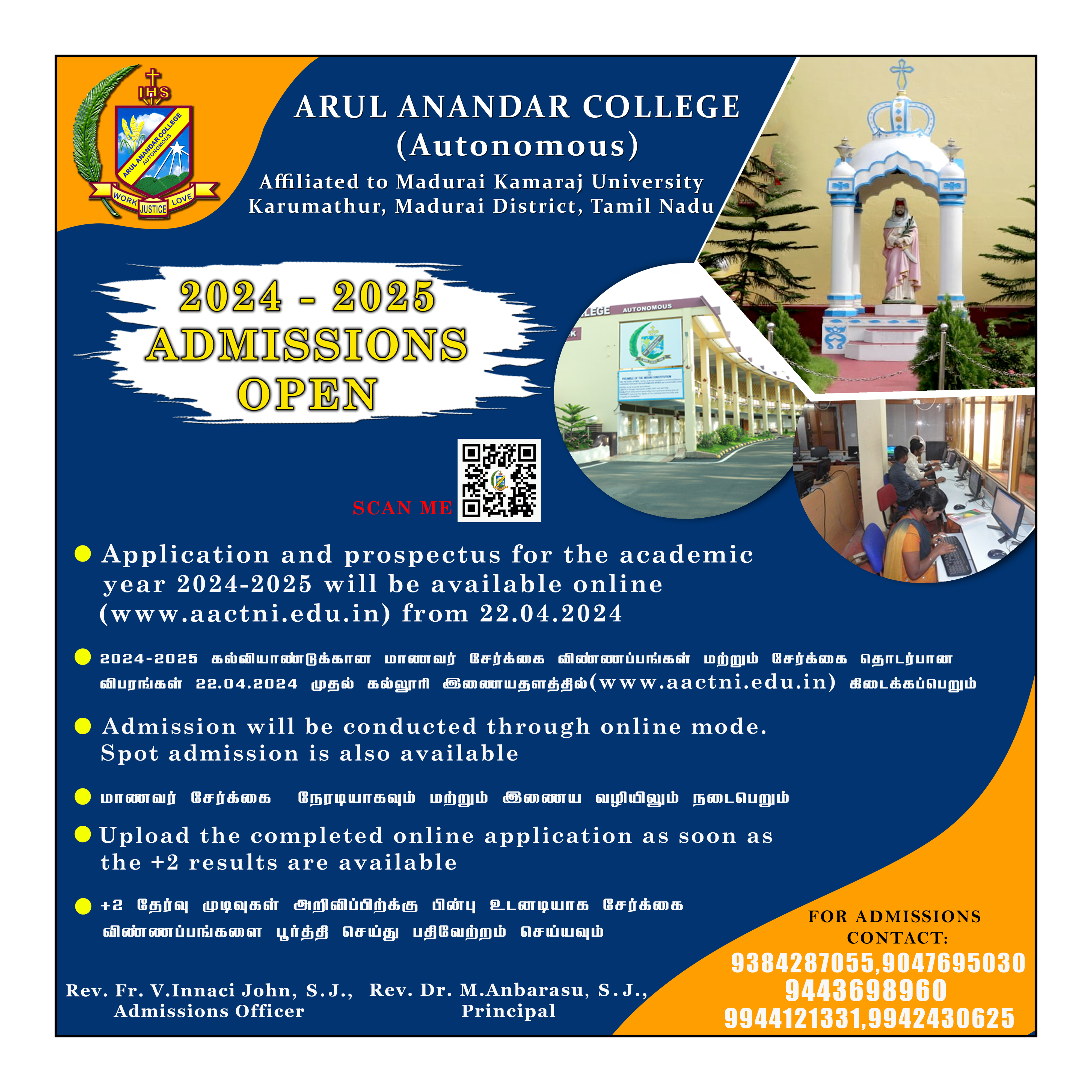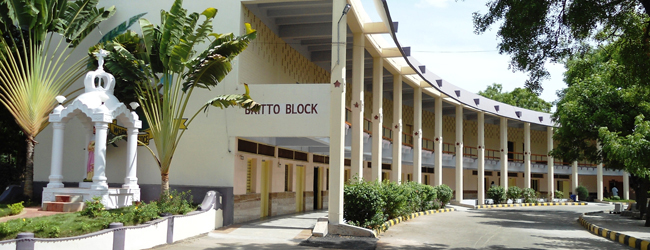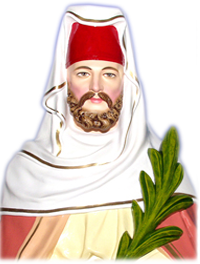- Home
- About us
- Administration
- Academics
- Research
- Accreditation
- Student Support
- Student Activities
- Outreach
- Admissions
- ERP
- Library Book
- IQAC-AQAR Portal
- Faculty Portal






About AAC | ||
 | ||
Arul Anandar College (Autonomous), a Minority Catholic Co-Educational Institution, affiliated to the Madurai Kamaraj University, is one among the four colleges, run by the Madurai Province of the Society of Jesus.
The other Jesuit colleges in Madurai Province, Tamil Nadu are: In Tiruchirapalli: St Joseph’s College (Autonomous) - 1844 In Palayamkottai: St Xavier’s College (Autonomous) - 1923 St Xavier’s College of Education (Autonomous) - 1950 Jesuits run 'B' Schools St. Joseph's Institute of Management, Trichy-2007 Xavier Institute of Business Administration, Palayamkottai-2012 These higher educational institutions under the chairmanship of the Provincial of the Jesuit Madurai Province follow a common policy for admissions, appointments and administration. As a minority institution Arul Anandar College caters primarily to the formation of Christian students. However, it keeps its portals open to all students without discrimination of caste creed, race, gender and class. | ||
St. Arul Anandar (Our Patron) | |
 | |
| St Arul Anandar (St John de Britto), is the Patron of our college. Born in Lisbon in 1647 in a wealthy and aristocratic family and brought up in a rich and royal atmosphere, he became a Jesuit and volunteered to come to India in September 1673.
He is one of the many Jesuit Missionaries who worked in the Madurai Mission, India. Brilliant and young Britto was offered a professorial chair at a college in Goa but he preferred to come to Madurai and work in the interior villages. Between 1675 and 1687 he dressed himself as an Indian sannyasi (Pandaraswamy). He was known as Arulanandarsamy, eating only vegetarian food on plantain leaf, and squatting on the floor for study and teaching. He entered the kingdom of the Maravas, the present Ramanathapuram and Sivagangai districts and began his work there. Great opposition, resistance and persecution were his rewards, which he faced with a gentle smile. He had the courage to condemn the wrong doings of both the mighty and the lowly. The conversion of Prince Thadiya Thevar incensed his enemies to persecute him and he was beheaded at Oriyur on February 4, 1693. His very name "Arul Anandar" means one who is filled with the grace and joy of the Lord which he manifested by his service to humanity and perseverance in suffering. He continues to inspire all through his dedication, devotion and determination, exhibiting grace and joy. | |
Milestones | |
| 1970 » | The College was founded as De La Salle College by the late Most Rev. Dr Justin Diraviam, Archbishop of Madurai Diocese with Pre University course and UG Courses in Economics and Philosophy. |
| 1971 » | BSc Mathematics was introduced. |
| 1972 » | Renamed as Arul Anandar College, it became a Jesuit institution. |
| 1973 » | Undergraduate Courses in Rural Development Science. |
| 1975 » | Bharat Ratna and Nobel Laureate St Teresa of Kolkata, founder of the Missionaries of Charity graced the campus. |
| 1979 » | B.Sc. Chemistry was introduced. |
| 1980 » | B.A. History and M.Sc. RDS was introduced. |
| 1984 » | M.A. Economics was introduced. |
| 1986 » | M.A. Philosophy was introduced. |
| 1987 » | AAC becomes an autonomous college and the Alumni Association was inaugurated. |
| 1988 » | B.Sc. Physics was introduced. |
| 1989 » | M.Phil. Economics was introduced. |
| 1995 » | The Parent-Teacher Association began. |
| 1999 » | Self-financed Courses in MCA and BCom with Computer Applications were started. |
| 2000 » | Computer Literacy programme was initiated - Dept. of R.D.S. becomes a Research Centre. |
| 2001 » | Dept. of Economics becomes a Research Centre - The college becomes co-educational - AAC Accreditated by NAAC with FIVE STARS. |
| 2003 » | B.B.A. and B.Sc. Info. Tech. & Mgnt. were introduced - Choice Based Credit System - UG (Aided) courses. |
| 2004 » | B.Sc. Physical Education and B.Sc. Mathematics (SF) was introduced - Internal Quality Assurance Cell was introduced. |
| 2005 » | M.Sc. Mathematics (SF) and M.Sc. Physics (SF) was introduced - Career Oriented Courses (COCs) were introduced. |
| 2008 » | NAAC Reaccreditation - 'A' grade - (CGPA of 3.52). Revised CBCS in all UG and PG courses |
| 2009 » | Women Studies Centre was established - "Awards of Excellence" for Staff and Students - Britto Publishing House gets started - State Level Fr Montaud Hockey Tournaments - State Level Fr Prince Foot-ball Tournaments. |
| 2011 » | B.A. English Literature was introduced. |
| 2012 » | B.Sc. Food Science & Technology was introduced - Bridge Course in English for UG first year students - Restructured Choice Based Credit System - Dept of Physics beomes a Research Centre. |
| 2014 » | NAAC Reaccreditation - 'A' grade (CGPA of 3.66) |
| 2016 » | DST FIST Awarded. |
| 2017 » | B.A. Tamil and M.Sc. Chemistry was introduced. |
| 2018 » | 9 Additional COC courses were introduced. |
| 2019 » | MA English Literature and Outcome Based Education (OBE) was introduced. |
| 2020 » | Autonomy Status was Extended. |
Vision and Mission | ||
| Vision | ||
| » | Integral Development of Rural Students and Empowering them for Social Transformation. | |
| Mission | ||
| » | To provide facilities for academic excellence, training in soft and professional skills and placement. | |
| » | To enable students to become agents of social transformation by imparting skills in research and social analysis. | |
| » | To build AAC into a policy advocacy centre. | |
| Strategy | ||
| » | Empowering rural students through innovative and socially contextualized education. | |
| » | Fostering a sense of human rights founded on dignity, equity and justice. | |
| » | Initiating ICT integrated socially relevant research. | |
| » | Promoting people friendly policies and programmes through networking. | |
| » | Establishing an organic link between lab and land. | |
| » | Facilitating gender equity both on and off the campus. | |
| » | Promoting stakeholder participation in academic and extension activities. | |
Objectives |
|
The National Policy on Education (1985) visualises that education should become dynamic as never before. Arul Anandar College (AAC) possesses all the features of the programme as well as strategies to impart the necessary dynamism to rural higher education. Thus the evolution and the development of AAC, with its preferential option for the poor, the MBC and the dalits, centres around the maintenance of proper standards. This objective is achieved by ensuring optimum utilisation of facilities, promoting innovation and change, relating education to emerging occupational patterns, and offering viability and equalization of educational opportunities for the weaker sections of the society, particularly the MBC and the Scheduled Castes, who form the majority of the student population of this institution. It must be pointed out, however, that the work of AAC as an agent of social change is not merely the change of behaviour and the acceptance of new values for living, so that individuals cease to be unjust, but also the transformation of an unjust society. Mere reform of existing structures is inadequate to remove the causes of injustice; hence the change of structures is necessary. Hence the option for the poor is an option for a just, free, fraternal and non-exploitative society, in which persons and communities find their human fulfilment. There is every reason to believe that the poor and the oppressed as victims of the present exploitative system will be the creators of a new just society. The option for the poor and the dalits in this context is an option to work for the awakening of the poor masses and to join in their struggles for a just social order. AAC, managed by the Jesuits of the Jesuit Madurai Province, is a minority institution. As such, it enjoys all the privileges and rights of the minorities enshrined in the Constitution of India and implemented by the Government of Tamil Nadu. It aims, in particular, at raising the standards of education and of living in area that is classified as the most backward area, and for this purpose the Department of Rural Development Science has been established. Conscious of the dire poverty of the masses and the prevailing moral and spiritual degeneration and social inequalities that beset our country, the management of the college gives important place to moral and spiritual values and desires to inculcate a strong sense of social justice in the students, hoping to make the institution, both in theory and practice, an agent of social transformation and move towards a just and equitable social order. To further the process of empowerment of women the Jesuit management has also opened the doors of this institution to women students at U.G. level from 2001 onwards and in June 2005 a women's hostel was established. Thus, this institution stands poised for the formation of the whole person, religiously oriented, morally upright, intellectually alert, socially conscious and committed and nationally concerned. |

Karumathur - 625514
Madurai District
Tamil Nadu, INDIA
principal@aactni.edu.in
arulanandarcollege@gmail.com